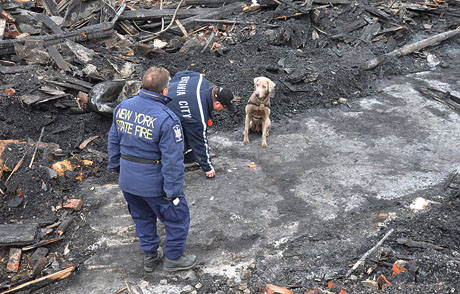Five witnesses went before the jury in the trial of Corfu resident Scott Franklin Doll, yet the panel still got out 45 minutes early this afternoon.
The jurors heard from a DNA expert, two men from the Genesee County Sheriff's office, a banker and a car-buying customer of SF Enterprises.
Here are some of the dots the jurors may be obliged to connect.
Forensic Biologist Ellyn Colquhoun, a DNA expert with the Monroe County Public Safety Lab, continued her testimony after the lunch break and testified that DNA could potentially be found in a single drop of blood.
The strength of DNA testing is in its ability to eliminate individuals who don't match in a criminal investigation.
Of the 27 items submitted to the lab for analysis, she personally was responsible for nine items. And of the 27, only seven were analyzed to determine if other DNA was present.
The bloody overalls were hauled out again and she pointed out all the areas tested, noting that the knees were heavily saturated with blood.
A single speck of blood on murder suspect Doll's face, out of three present, had two DNA profiles -- victim Joseph Benaquist's and Doll's.
All of the other samples tested contained only Benaquist's blood and DNA, including the camouflage overalls, the sneakers, and the Ford Windstar.
"You don't know how that blood got where it did, only that it was on the items," asked Doll's co-counsel Daniel Killelea.
Correct, responded Colquhoun.
Swabs from the Nissan Altima and the Pontiac G6 found at the scene were submitted but never asked to be analyzed by the Genesee County District Attorney's office.
"Many things are submitted, but relatively few are tested," said Deputy District Attorney William Zickl during the jury's afternoon recess.
That is not willy-nilly. Ultimately, after convening with the D.A.'s office, the crime lab, on a case-by-case basis, determines which items get analyzed.
This was the case in regard to Benaquist's fingernail clippings snipped during the autopsy. They were submitted for analysis but ultimately that was not deemed of utmost importance. Only items with the greatest exculpatory evidence value is tested.
Lastly, she testified that while DNA testing typically takes six weeks, it has been known to take a year or more, noting that some incomplete cases on her desk are over 12 months old.
Next up was John Dehm, a youth officer with the Genesee County Sheriff's Office, which is part of the Criminal Investigation Division. He testified that he was selected, based on previous experience, to take aerial photos of the crime scene. He did so while aboard a State Police helicopter on Feb. 17, 2009, the same day Benaquist's body was found.
He also took part in two different ground searches in the vicinity. He testified that he was among a group of about 10 officers from the Sheriff's and State Police offices who fanned out along the roadways to search for evidence.
One such search occurred on the east side of North Lake Road, where Doll was found walking toward the crime scene. A second search, with about six participants, occurred along the west side of the same road. In both instances, a few searchers used rakes. There were no metal detectors or canines used in either search.
They found nothing of evidentiary value, but did not scour the area again.
"It's always possible we missed something," Dehm noted.
Then Sheriff's Deputy John Duyssen told the jurors he was an accident reconstructionist and a crime-scene diagrammer. He took measurements, at points indicated by Investigator Steve Mullen, and used those to create a scale drawing of the vicinity in which the crime occurred.
The upshot was that the Adesa Car Auction is nearly six miles (on a vehicle odometer) from the gas station/repair shop (Pembroke Enterprises) near Beneaquist's house on Knapp Road. If the other logical route is taken, the distance is 5.7 miles, with Killelea noting that the portion driven on Route 5 may be busier that other roadways and therefore take more time.
Commercial banker H. Michael Easton, who has been in banking for 31 years, testified on behalf of M&T Bank. Under questioning from District Attorney Lawrence Friedman, he verified several items for inclusion into evidence.
These included: a copy of Doll's bank statement for portions of 2008-09; the form Doll signed to open one of his several accounts on May 26, 2004; Doll's official business certificate as a registered car dealer from the New York DMV; and a copy of a check from Key Bank for $10,000, from Doll's business, SF Enterprises, deposited into the newly opened M&T Bank account.
Last up was car buyer Mark Kobal of Bergen. He told the jury that he had satisfactorily bought a car from Scott Doll a few years ago. When he decided to buy another car in 2008, he again contacted Doll. He told him he wanted to buy a Dodge Grand Caravan.
But Josh Doll is the one who went to the Adesa auction and bought a car for Kobal. Due to miscommunication, he bought the smaller Caravan, instead of the Grand Caravan. The vehicle was registered then and there at the auction, meaning Kobal owned it and had to pay for it.
After that was done and he explained his disatisfaction, it was agreed he'd go ahead and sell the smaller Caravan himself, and then take those proceeds and buy a Grand Caravan. That was done two or three weeks afterward.
But one Saturday afternoon, he lent the mini-Caravan to the Dolls so they could take it to Adesa to show the auction house financiers that they still "had possession of it," because there was a lien against it and proof of possession would satisfy the lien. Of course, they actually did not have possession of the vehicle. It was wholly Kobal's and he merely lent it to them for a few hours to help them out.
Kobal said that he dealt with both Scott and Josh in his transactions with SF Enterprises.




